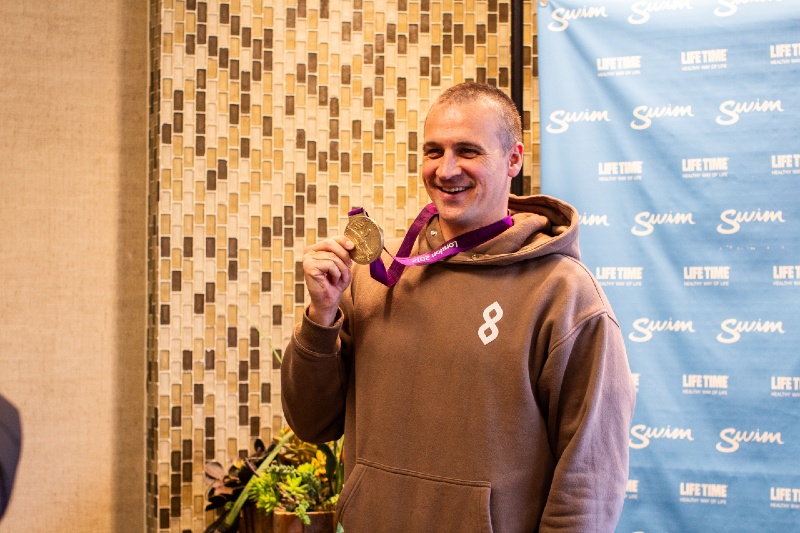Ryan Lochte discusses the importance of setting goals, nutrition, and sleep

Ryan Lochte at LifeTime in Garden City. Photo Credit: Alaina Bello
On Saturday, January 20, 12-time Olympic medalist Ryan Lochte hosted his “Legendary” Swim Clinic at LifeTime in Garden City.
The Olympian spoke to kids, the youth, and adults of all ages that gathered on Long Island, New York. He was joined by his father, Coach Steven Lochte, who has been coaching the sport for over five decades. Ryan described his father as the “guru of swimming.”
They underscored the importance of perseverance, proper nutrition, the need to listen to your coach, and goal-setting, whether it is long-term or short-term goals, or both.
Background on Ryan Lochte
Throughout his competitive career in sports, Ryan has earned over 90 medals, 54 of which are gold. He has set 14 world records in swimming, three of which still stand to this day.
Ryan’s first world record dates back to 2007, which he set in the men’s 200 meter backstroke race, and most impressive about the record was that he accomplished it a few weeks after a broken foot.
Coach Steven: ‘Perseverance is key’
Ryan remarked, “I love helping kids and everyone to learn more about the sport of swimming. I am still going.”
Coach Steven stated that “perseverance” is a key word in athletics and noted that once you learn the elements of each stroke (freestyle, butterfly, breaststroke and backstroke), everything else your coach will tell you will fall into place.
A major factor that played a vital role in Ryan’s career was his ability to master all four strokes in the individual medley.
Three guidelines and rules to succeed in sports and in life
Ryan shared his three guidelines and rules to succeed not only in sports, but in life. First, it is important to “listen to your coach.” Second, set short-term and long-term goals each day. “Each time I went to practice, I had a specific goal,” Ryan revealed.
Third, “have fun.” “That’s what the sport is all about,” Ryan said. “I’ve enjoyed every second of the pool. These guidelines can be used in every situation in life. These rules helped cultivate my success. Happy people swim faster,” he acknowledged.
The need for proper nutrition
“I am still not a saint when it comes to nutrition,” Ryan admitted. “I still have my cheat days on Fridays with pizza wings and I still like my sugars. When I got to college, I got a nutritionist, and I started eating healthier.”
“I was watching what I was eating and what I was putting in my body. I was watching the right nutrients that I was putting in, and I started noticing a huge difference. I realized that my back-to-back practices were going great because I was eating the right nutrients,” he elaborated.
“Then, I was eating healthier and healthier, and I started noticing that my practices were going phenomenal as a result, to the point where I was racing near world record pace in my practices,” he said.
“I kept on doing that, and I noticed I was recovering faster, and I was swimming incredibly. I also noticed that I was happier and in a better mood,” he observed.
“You need to treat your body like a race car. You need the best gasoline in your race car,” he acknowledged. “You want the best nutrients for your body. If I knew all this when I was younger, I would have been a way better athlete than I am now.”
“What you put in your body has an overall effect not only on your performance but your mood as well,” Ryan added.
Sleeping as a recovery mechanism
The world champion also addressed the significance of sleeping. “Sleeping is very big because it helps you recover,” he said. “In my hard days of training, I would get on average seven to nine hours of sleep every night, which was ideal.”
“Getting the right amount of sleep helps you recover, and it helps you feeling better, and it puts you in a good mood to compete.”

Modeling each of the four strokes
Ryan was battling a broken femur at this clinic, so he was assisted by teen swimmers Strahinja Maslo and Martin Perecinsky, both of which were able to coach and model the young swimmers and other participants on how to properly do each of the four strokes.
Coach Steven gave a crash course on the physics of water dynamics.
Ryan’s motivation dates back to watching the 1992 Olympics
Ryan opened up about what motivated him to do this professionally. This dates back to 1992, when he was watching Pablo Morales compete at the 1992 Olympic Games in Barcelona. To this day, his love, energy, and passion for the sport has remained intact and unphased.
Coach Steven expressed that he is proud of Ryan because of his “character,” “giving back to the sport,” and for “caring about people.”
Teen swimmer Strahinja Maslo remarked, “It feels amazing to be here, especially to see a world champion and having him share what had him so great. It was a great event.”
“It is nice to see a different side of swimming. Normally, it is me swimming, but today, I’m coaching, so it is nice to see things from a different perspective,” said swimmer Martin Perecinsky.
With this “Legacy” in-person event, Ryan Lochte proved that his talent in competitive sports can only be surpassed by his huge heart and humility outside of the pool. His ambition, passion, and life story are an inspiration to us all.
For more information on Ryan Lochte, check out his official homepage, and follow him on Instagram and Facebook.
Ryan Lochte discusses the importance of setting goals, nutrition, and sleep
#Ryan #Lochte #discusses #importance #setting #goals #nutrition #sleep





